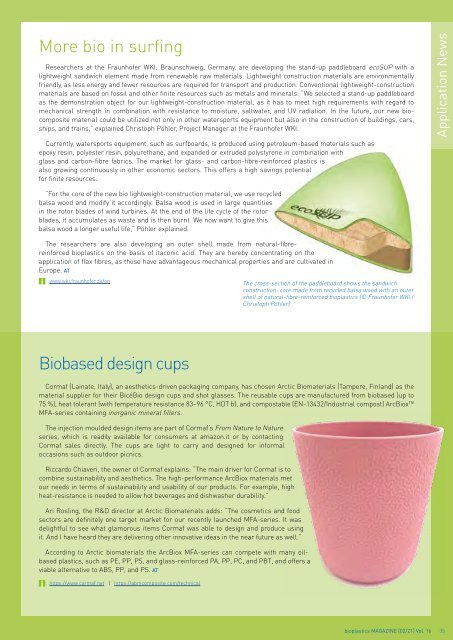issue 02/2021
Highlights: Injection Moulding Basics: Mass Balance
Highlights:
Injection Moulding
Basics: Mass Balance
You also want an ePaper? Increase the reach of your titles
YUMPU automatically turns print PDFs into web optimized ePapers that Google loves.
More bio in surfing<br />
Researchers at the Fraunhofer WKI, Braunschweig, Germany, are developing the stand-up paddleboard ecoSUP with a<br />
lightweight sandwich element made from renewable raw materials. Lightweight construction materials are environmentally<br />
friendly, as less energy and fewer resources are required for transport and production. Conventional lightweight-construction<br />
materials are based on fossil and other finite resources such as metals and minerals. “We selected a stand-up paddleboard<br />
as the demonstration object for our lightweight-construction material, as it has to meet high requirements with regard to<br />
mechanical strength in combination with resistance to moisture, saltwater, and UV radiation. In the future, our new biocomposite<br />
material could be utilized not only in other watersports equipment but also in the construction of buildings, cars,<br />
ships, and trains,” explained Christoph Pöhler, Project Manager at the Fraunhofer WKI.<br />
Currently, watersports equipment, such as surfboards, is produced using petroleum-based materials such as<br />
epoxy resin, polyester resin, polyurethane, and expanded or extruded polystyrene in combination with<br />
glass and carbon-fibre fabrics. The market for glass- and carbon-fibre-reinforced plastics is<br />
also growing continuously in other economic sectors. This offers a high savings potential<br />
for finite resources.<br />
Application News<br />
“For the core of the new bio lightweight-construction material, we use recycled<br />
balsa wood and modify it accordingly. Balsa wood is used in large quantities<br />
in the rotor blades of wind turbines. At the end of the life cycle of the rotor<br />
blades, it accumulates as waste and is then burnt. We now want to give this<br />
balsa wood a longer useful life,” Pöhler explained.<br />
The researchers are also developing an outer shell made from natural-fibrereinforced<br />
bioplastics on the basis of itaconic acid. They are hereby concentrating on the<br />
application of flax fibres, as these have advantageous mechanical properties and are cultivated in<br />
Europe. AT<br />
www.wki.fraunhofer.de/en<br />
The cross-section of the paddleboard shows the sandwich<br />
construction: core made from recycled balsa wood with an outer<br />
shell of natural-fibre-reinforced bioplastics (© Fraunhofer WKI I<br />
Christoph Pöhler)<br />
Biobased design cups<br />
Cormaf (Lainate, Italy), an aesthetics-driven packaging company, has chosen Arctic Biomaterials (Tampere, Finland) as the<br />
material supplier for their BicéBio design cups and shot glasses. The reusable cups are manufactured from biobased (up to<br />
75 %), heat tolerant (with temperature resistance 83–96 °C, HDT b), and compostable (EN-13432/Industrial compost) ArcBiox TM<br />
MFA-series containing inorganic mineral fillers.<br />
The injection moulded design items are part of Cormaf’s From Nature to Nature<br />
series, which is readily available for consumers at amazon.it or by contacting<br />
Cormaf sales directly. The cups are light to carry and designed for informal<br />
occasions such as outdoor picnics.<br />
Riccardo Chiaveri, the owner of Cormaf explains: “The main driver for Cormaf is to<br />
combine sustainability and aesthetics. The high-performance ArcBiox materials met<br />
our needs in terms of sustainability and usability of our products. For example, high<br />
heat-resistance is needed to allow hot beverages and dishwasher durability.”<br />
Ari Rosling, the R&D director at Arctic Biomaterials adds: “The cosmetics and food<br />
sectors are definitely one target market for our recently launched MFA-series. It was<br />
delightful to see what glamorous items Cormaf was able to design and produce using<br />
it. And I have heard they are delivering other innovative ideas in the near future as well.”<br />
According to Arctic biomaterials the ArcBiox MFA-series can compete with many oilbased<br />
plastics, such as PE, PP, PS, and glass-reinforced PA, PP, PC, and PBT, and offers a<br />
viable alternative to ABS, PP, and PS. AT<br />
https://www.cormaf.net | https://abmcomposite.com/technical<br />
bioplastics MAGAZINE [<strong>02</strong>/21] Vol. 16 35


















